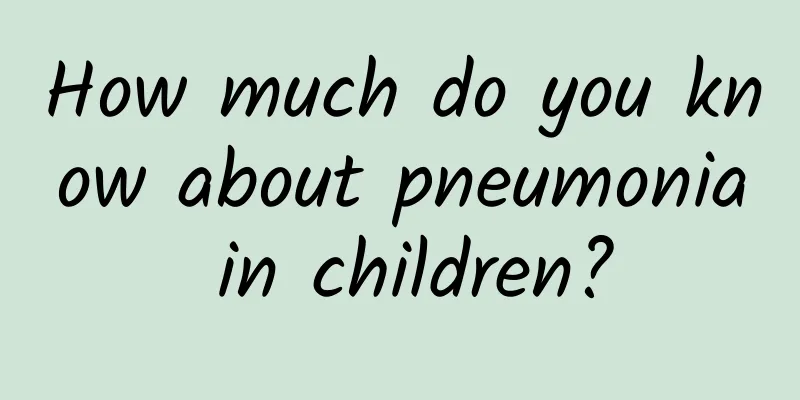How much do you know about pneumonia in children?

|
Pediatric pneumonia refers to lung inflammation caused by different pathogens or other factors, such as inhalation of amniotic fluid, oils or allergic reactions. Pediatric pneumonia is mainly manifested by rapid onset, fever or no fever, pale complexion, irritability, cough and shortness of breath, occasional vomiting, diarrhea, cyanosis, scattered moist rales in the lungs, etc. Infants and young children with pneumonia can see scattered small shadows when they go to the hospital for X-ray examination. Older children mainly show symptoms such as rapid onset, high fever, chills, delirium, cough, dyspnea, cyanosis, etc. X-ray examination can see large dense shadows in the lungs. Pediatric pneumonia is a common respiratory disease in childhood. Patients with pediatric pneumonia need to go to the hospital for regular treatment in time. In addition to regular treatment, reasonable and scientific nursing measures are also important, which can help sick children improve their symptoms and help children recover as soon as possible. At this stage, many people still don’t know enough about pediatric pneumonia. The following is the popularization of pediatric pneumonia knowledge, hoping to help people learn more knowledge. 1. Common symptoms of pneumonia in children (1) Increased body temperature: You can check the changes in the child's body temperature by measuring the body temperature or taping the forehead. Most children with pneumonia will have a fever, and the body temperature is above 38°C. The child will have a high fever again after taking antipyretics. However, the duration of the fever cannot be the only basis for judging pneumonia. Some babies have developed pneumonia after only two days of fever, while some babies have a fever for a week but it is not caused by pneumonia. Therefore, fever cannot be the only basis for pneumonia. The following symptoms must be present to be judged as pneumonia. (2) Difficulty breathing: Children with pneumonia will basically have a severe cough or wheezing, which is called difficulty breathing. If the child has a cough and rapid breathing, it is called mild pneumonia; if there is rapid breathing and chest retraction, it is severe pneumonia. Milder pneumonia can be treated at home, while more severe pneumonia requires hospitalization for treatment and care. (3) Mental anxiety: If a child has pneumonia, he or she may also have abnormal mental conditions, such as frequent anxiety, constant crying, drowsiness, and even epilepsy. (4) Loss of appetite: After a child has pneumonia, his or her appetite will decrease significantly, and he or she will cry constantly when feeding. If the child has a loss of appetite, it is necessary to continue feeding, feeding, and drinking more soup to improve the child's own body resistance to disease. (4) Restless sleep: The early symptom of pneumonia in children is crying, and breathing difficulties will worsen at night. (5) There is a sound of bubbling in the chest: Put your ears against the chest wall on both sides of the child's spine and listen carefully to see if there is a gurgling sound. This is also called a micro-bubble sound, which is the primary feature of pneumonia in children. 2. Nursing measures for children with pneumonia (1) Keep the environment fresh and comfortable: A quiet environment with appropriate temperature and humidity is more conducive to the recovery of children's health. Nursing staff need to keep the indoor temperature at around 20℃, and the humidity needs to be controlled at 55-65% to prevent the children's respiratory secretions from drying up, so as not to affect the coughing of secretions in the respiratory tract. At the same time, cross-infection should be avoided. Pay attention to the fact that there should not be too many people in the room where the children are located. The visiting time must be strictly controlled. The room needs to be ventilated frequently to keep the air in the room flowing, but attention should be paid to cross-drafts to prevent affecting the recovery of pneumonia. (2) Replenish the water needed by the body: Drinking more water can help discharge sputum and ensure the normal functioning of the human body. Therefore, it is necessary to let the children drink more water, help and guide the parents of the children to pat the back and turn the children over to help the children discharge sputum in the respiratory tract. If the children are infants, they must insist on breastfeeding. Infants and young children who are fed artificially are prone to diarrhea and need more attention. Children with mild symptoms should be given light, easy-to-digest, and multivitamin-rich foods. Children in the recovery period need to be given nutritious and high-calorie foods. Children who are critically ill and have difficulty eating need to be given intravenous infusions to replenish energy and water. (3) Smooth breathing: After a child develops pneumonia, his or her breathing will be restricted and the body will suffer from varying degrees of hypoxia. Therefore, it is necessary to help the child clear the nasal cavity, improve the child's original ventilation function, increase alveolar ventilation, and correct hypoxia. (4) Oral care: For children with a lot of sputum, try to expel the sputum as much as possible to avoid the direct impact of sputum discharge on the recovery of pneumonia. If the condition permits, the child can be picked up and gently patted on the back. For children who cannot get up from bed, it is necessary to turn the child over regularly to avoid lung congestion and make it easier to cough up sputum, which helps the child recover. (5) Remind the child to take medication: Taking medication on time can effectively prevent repeated pneumonia attacks and play a role in curing pediatric pneumonia. (6) Physical exercise: Children can be taken outdoors for activities regularly, but the activity area must be kept clean and tidy. Children should be allowed to get more sun exposure to improve their ability to adapt to temperature changes. Clothing should be added or removed appropriately according to weather changes. 3. What is the best diet for children with pneumonia? (1) Children with pneumonia need to replenish the water and nutrients they need in time. (2) Pay attention to the diet, which must be light and easy to digest, and replenish the high-quality protein needed by the body. If children with pneumonia often have high fever, poor appetite, and are unwilling to eat, they need to be given a light and easily digestible diet. (3) Diet for patients with fever: Give patients a liquid diet, such as rice soup, egg drop soup, beef soup, vegetable soup, fruit juice, etc. (4) Diet for patients after fever subsides: You can appropriately increase semi-liquid diet, such as porridge, noodles, cakes and other foods, because children with pneumonia have more breathing times and fever, and water evaporates faster than usual. Supplement sugar and salt water when necessary. (5) Prohibit spicy and irritating foods: Such foods will aggravate children's pneumonia, and patients must avoid eating them. Spicy and irritating foods are easy to damage body fluids due to heat, so try not to add chili oil, pepper and other foods to the food of children with pneumonia. (6) Children are prohibited from eating greasy food: for example, pine egg yolks, crucian carp roe and other foods are greasy foods that can easily cause gastrointestinal discomfort. The body does not get the nutrients it needs, which will gradually reduce the child's resistance to disease and is not conducive to health recovery. Author: Zhao Jing, Hainan Hospital, PLA General Hospital |
<<: What should kidney disease patients pay attention to during pregnancy? Just read this article
>>: You can tell whether you have kidney disease by looking at your urine!
Recommend
How to get pregnant easily
Couples who are preparing for pregnancy are undou...
Pimples on lower body after menstruation
Women should pay attention to their own hygiene, ...
Can a pregnant woman still breastfeed after taking milk-reducing medicine?
Newborns drink breast milk after birth, which is ...
Will sitting on a hot bench that someone else has sat on cause hemorrhoids, boils, or even STDs? Let's clarify once and for all →
During the morning and evening rush hours, when y...
Where do ovarian cysts grow?
Ovarian cyst is a very complicated female disease...
Pregnant women eat sweet potatoes
During the confinement period, the mother's b...
What causes excessive farting during breastfeeding?
It is also a common phenomenon for women to fart ...
If I urinate twice a night, does that mean my kidneys are not good? What causes increased nocturia?
A neighbor, Mr. Wang, who is over 60 years old, t...
What to do with benign uterine tumors?
The uterus is the most important organ for women....
Five methods of donkey-hide gelatin cake that you must know for health preservation
Autumn and winter are the best seasons for nouris...
There is also a golden period for the treatment of "eye stroke"
Popular Science Times intern reporter Wang Wenjie...
How to relieve lower abdominal pain before menstruation
Menstruation is the physiological period of women...
What causes excessive phlegm after pregnancy?
The phenomenon of excessive phlegm is very common...
Is it reasonable that the community does not allow people to go out to buy groceries? What should I do if the community is closed due to the epidemic?
Is it reasonable that the community does not allo...
Paroxysmal atrial fibrillation and persistent atrial fibrillation may induce cerebral infarction and should be avoided.
A friend told Huazi that he had atrial fibrillati...









